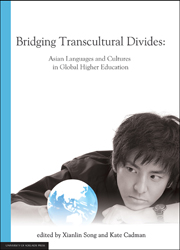Book contents
- Frontmatter
- Contents
- Acknowledgements
- List of Contributors
- Foreword
- Part I Another pedagogy is possible
- Part II Re-locating teaching and learning
- 2 What are the implications for learning in Australian universities if and when the centre of the world shifts towards Asia?
- 3 (Post) Modern times: Transcultural exchange and the circumstances of postgraduate social science research
- Part III Transforming curriculum in Asian language teaching
- Part IV Capitalising on Asian social and cultural studies in contexts of diversity
- Part V Bridging learning gaps
2 - What are the implications for learning in Australian universities if and when the centre of the world shifts towards Asia?
from Part II - Re-locating teaching and learning
Published online by Cambridge University Press: 05 June 2013
- Frontmatter
- Contents
- Acknowledgements
- List of Contributors
- Foreword
- Part I Another pedagogy is possible
- Part II Re-locating teaching and learning
- 2 What are the implications for learning in Australian universities if and when the centre of the world shifts towards Asia?
- 3 (Post) Modern times: Transcultural exchange and the circumstances of postgraduate social science research
- Part III Transforming curriculum in Asian language teaching
- Part IV Capitalising on Asian social and cultural studies in contexts of diversity
- Part V Bridging learning gaps
Summary
Introduction
In this chapter I aim to argue that the centre of the world has begun to shift away from the West and towards Asia — the ‘West’ and ‘Asia’ in terms of geography but more importantly in terms of cultural tradition and political values — and that this centre shifting will have wide-ranging and far-reaching implications for learning at Australian universities. This argument contains three related tasks. The first is to outline briefly that the centre of the world has been the West for a long time, arguably since Columbus's symbolic sail to America. The second task is to demonstrate that there are at least indications and preliminary evidence that the centre has begun to shift, with the rising of China and India in recent years. Note that I do not wish to claim that the centre of the world will be Asia for the foreseeable future. I only argue that the overwhelming dominance of the West is a thing of the past. The final task of this chapter is to postulate some implications for learning at Australian universities as a result of the rise of Asia in general, and China in particular, on this globe where there will be different claims of value supremacies and legitimacies.
Issues, concepts and the change of global forces
When we talk about the learning of Asian languages and studies of Asian culture, it is usually taken for granted that that is what we should do at a university in Australia. But Asian languages and cultures are not courses that must necessarily be taught at an Australian university, in the same way as mathematics, English or physics.
- Type
- Chapter
- Information
- Bridging Transcultural DividesAsian Languages and Cultures in Global Higher Education, pp. 29 - 48Publisher: The University of Adelaide PressPrint publication year: 2012



